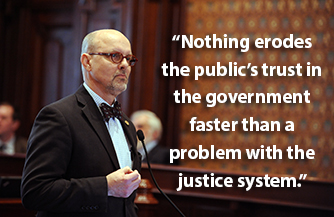In Illinois, police dispatchers can tip off criminals
 SPRINGFIELD – In 2010, the Illinois Supreme Court ruled that it's not a crime for a police dispatcher to tip off a criminal that law enforcement is on the way. The court called the case "troubling" and the defendant's actions "unjustifiable," but found nothing in Illinois law making such behavior illegal. State Senator Dave Koehler (D-Peoria) wants to change that.
SPRINGFIELD – In 2010, the Illinois Supreme Court ruled that it's not a crime for a police dispatcher to tip off a criminal that law enforcement is on the way. The court called the case "troubling" and the defendant's actions "unjustifiable," but found nothing in Illinois law making such behavior illegal. State Senator Dave Koehler (D-Peoria) wants to change that.
"We have to be able to trust everyone in law enforcement to enforce the law," Koehler said. "Nothing erodes the public's trust in the government faster than a problem with the justice system."
The story starts in the Chicago suburbs. In 1998, a police dispatcher named Carmecita Williams tipped off a local drug dealer that law enforcement officials were in the area near his house. When Ms. Williams' actions came to light, the Cook County State's Attorney charged her with official misconduct. The trial court found her guilty and sentenced her to two years probation and 250 hours of community service.
However, Ms. Williams appealed the verdict. The appellate court ruled that nothing in Illinois law allowed her to be charged with official misconduct. The local police department had every right to fire her, but she hadn't broken any Illinois law. In 2010, the Supreme Court agreed.
Throughout the entire process, the courts had no doubt that Ms. Williams had tipped off the drug dealer.
Koehler's proposal would make it a Class 3 felony for a police dispatcher – or anyone in a similar position – to warn a criminal that law enforcement is nearby or on the way by expanding the definition of official misconduct to include this circumstance. The crime of official misconduct already covers a wide variety of corrupt acts by public employees, including accepting bribes and misusing one's authority for personal gain.
The penalty for a Class 3 felony is two to five years in prison.
Koehler's legislation, Senate Bill 2695, is currently waiting to be assigned to committee.


